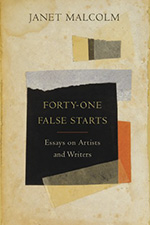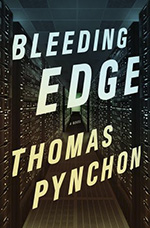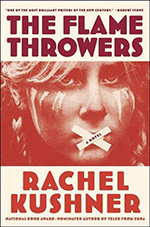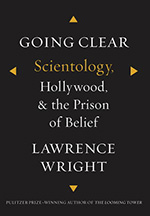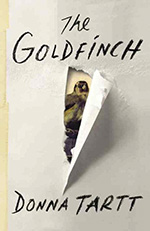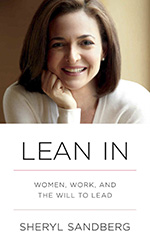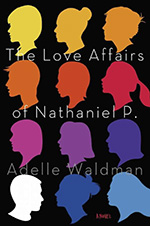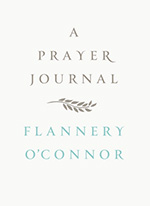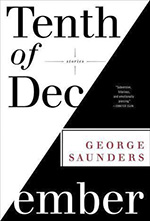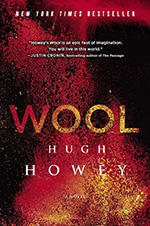
Slate is an Amazon affiliate and may receive a commission from purchases you make through our links.
The Slate Book Review Top 10 of 2013
The 10 most crucial books of the year.

Illustration by Frederik Peeters
Monday: Slate staffers pick their favorite books of 2013.
Tuesday: The overlooked books of 2013.
Wednesday: The best lines of 2013, and the best poetry of 2013.
Thursday: Dan Kois’ 15 favorite books.
Friday: The Slate Book Review Top 10.
41 False Starts: Essays on Artists and Writers by Janet Malcolm
Read Alice Gregory’s Completist column about Janet Malcolm.
Janet Malcolm may be both America’s best journalist and the one most critical of the enterprise of journalism. This collection of profiles and critical essays, featuring pieces on Diane Arbus, Ingrid Sischy, Edith Wharton, and David Salle, reveals, as usual, her formidable abilities for scene-setting, characterization, and formal innovation. But her essay “Thoughts on Autobiography From an Abandoned Autobiography” declares that years of committing acts of journalism have destroyed her imagination. The book, Alice Gregory wrote in May, matter-of-factly highlights “the fraudulence of profiles in general: The subject and the journalist construct an event together for the sake of retroactively describing it.”
Bleeding Edge by Thomas Pynchon
Read Troy Patterson’s review of Bleeding Edge.
Listen to the Audio Book Club discuss Bleeding Edge.
Read Forrest Wickman’s catalogue of Pynchon’s WTFs.
“Who you gonna call when a screaming comes across the sky?” Troy Patterson asked in September—who else but America’s great clown laureate of paranoia Thomas Pynchon, who, in this novel set in 2001 New York, explores the deflating dot-com bubble, the systems of chatter that give rise to trutherism, and the tight hold family can have even in the dystopia of the modern world. (Fittingly, this novel about the weirdness seeping in from every side featured an all-time weird audiobook performance, from the amazing Jeannie Berlin.) “Reading Bleeding Edge,” Patterson wrote, “tearing up at the beauty of its sadness or the punches of its hilarity, you may realize it as the 9/11 novel you never knew you needed.”
The Flamethrowers by Rachel Kushner
Listen to the Audio Book Club discuss The Flamethrowers.
Rachel Kushner’s fiery novel of speed, sex, art, and revolution divided critics when it was published this summer (and some suggested the divide had more to do with critics’ gender than the book itself). But the book is a tour de force, setting its heroine, Reno, loose on the Nevada desert, the 1970s New York art scene, and the street riots of Rome. It’s a story that many readers love fiercely: When Dan Kois admitted in September’s Audio Book Club that he didn’t quite get the novel, Hanna Rosin was unimpressed: “Well, I know the book is great, Dan, and so therefore I know the fault is with you.”
Going Clear: Scientology, Hollywood, and the Prison of Belief by Lawrence Wright
Listen to the Audio Book Club discuss Going Clear.
Listen to June Thomas interview Lawrence Wright.
Listen to Lawrence Wright read from the book and answer questions.
Years in the making, unpublishable in the United Kingdom, dense, weird, and jaw-dropping: Lawrence Wright’s epic history of Scientology is not just an immensely valuable chronicle of a uniquely American subculture. It’s also a fantastically entertaining story, featuring three larger-than-life spiritual leaders: L. Ron Hubbard, Scientology’s self-promoting, difficult founder; David Miscavige, the church’s charismatic current leader, whose wife hasn’t been seen since 2007; and Tom Cruise, the church’s best and worst ambassador to the world. In April’s Audio Book Club, Hanna Rosin was in awe: “I bow down to Lawrence Wright. I cannot believe the feats of reporting that went into this book.”
The Goldfinch by Donna Tartt
Read the Slate Book Review author-editor conversation between Donna Tartt and Michael Pietsch.
Listen to the Audio Book Club discuss The Goldfinch.
Once every 10 years or so, Donna Tartt emerges with a big, ambitious novel that rockets to the top of the best-seller list and has everyone you know furiously turns pages, desperate to find out what happens next. This new book, about an orphaned boy and a stolen painting, is just as addictive as The Secret History, but Tartt’s book is also illuminating about the impact art can have on a person’s life and heartbreaking about the loneliness of loss. “She’s very, very good at what she does,” Meghan O’Rourke said in December’s Audio Book Club. “I don’t know anyone who can write the books she does.”
Lean In: Women, Work, and the Will to Lead by Sheryl Sandberg
Read Amanda Hess’ review of Lean In.
Listen to the DoubleX Gabfest’s discussion of Lean In.
Read Katherine Goldstein’s account of joining a Lean In circle.
Every once in a while a book comes along that sets the topic of conversation for months to come. This spring, Sheryl Sandberg’s call to arms for women in the workplace was that book. Even before it was published, it was mandatory to have an opinion about Sandberg and her message; once it was out there, it spurred a yearlong conversation about gender, work, ambition, and privilege in every magazine, on every blog, and around every water cooler. Love it or hate it, Sandberg and her book will forever be a founding document for a generation of career women who found in its pages advice, sympathy, understanding, provocation—or just a way to start the discussion they’ve been needing to have for years. Sandberg may not “speak to every woman’s circumstance,” Katherine Goldstein wrote in April—“is there any book that does?”—but “she succeeds in speaking to mine.”
The Love Affairs of Nathaniel P. by Adelle Waldman
Read L.V. Anderson’s review of The Love Affairs of Nathaniel P.
Read Katie Roiphe’s essay on the novel.
Adelle Waldman’s pitch-perfect portrait of a very specific urban type—the “Sensitive Literary Man,” as Katie Roiphe wrote in July—had members of the tribe recognizing themselves, with horror, all summer long. But the novel isn’t just an anthropological success; it’s an impeccably written comedy of manners in which a smart, sensitive, modern guy dates a girl he should be all accounts be crazy about—but instead finds out that, as L.V. Anderson wrote in July, “perhaps his dick is not beholden to the same progressive ideals his brain is.”
A Prayer Journal by Flannery O’Connor
Read Marian Ryan’s review of A Prayer Journal.
Written in 1946 and 1947—when the barely-20-year-old Flannery O’Connor was a student at the University of Iowa—and only recently discovered in her papers, this slim journal of meditations and prayers reveals a devout Christian and an ambitious writer struggling to reconcile those two sides of her soul. A Prayer Journal is the rare book that instantly forces you to reconsider everything you know about a writer’s life and work, though the overwhelming sentiment the book spurs is sadness at how early God took her away. As Marian Ryan wrote in November, “To think, if she had lived, and written, all those years!”
Tenth of December by George Saunders
Read the Slate Book Review author-editor conversation between George Saunders and Andy Ward.
Listen to the Audio Book Club’s discussion of Tenth of December.
Listen to Saunders read from and answer questions about the book.
George Saunders has been a writer’s writer, a sentence-fetishist’s darling, for a long time. But when the New York Times Magazine declared Tenth of December “the best book you’ll read this year”—on Jan. 3—readers took notice, pushing this lovely, bizarre short story collection onto the best-seller list. Luckily, Saunders is as mordantly creative as ever, using the corrupt languages of this modern world—ad copy, teenspeak, bureaucratese—to explore the barriers against human dignity and the boundlessness of the human heart. Indeed, if this book feels different from his previous stories, it’s due to Saunders’ dogged optimism: “I found myself trying to avoid,” Saunders said in his author-editor conversation in January, “what we might call the ‘knee-jerk negative swerve.’ Or ‘the choice that indicates humans are always shit.’ ”
Wool by Hugh Howey
Read Tammy Oler’s review of Wool.
Though it’s on our 2013 list, Wool was first published in 2012. This story about humans trapped in an underground silo amid a post-apocalyptic wasteland was self-published as an ebook, which climbed inexorably up Amazon’s rankings until a New York publisher took notice, signing Howey up to a sweetheart deal and releasing Wool in print this spring. What’s most unique about Wool, though, is the way that Howey has opened the creative process up to his vocal fans—and the way he not only allows fan fiction but actually endorses it. Wool is a DIY, new media success story, sure—so it’s gratifying that it’s also a thrilling sci-fi novel, equally adept at world-building, pulling the rug out from under its readers, and commenting in classic sci-fi fashion on our own present day. “Being in the silo is like living in a world where the decisions were made a long time ago by people you didn’t vote for,” Tammy Oler wrote in March. “Sound familiar?”
---
See all the pieces in this month’s Slate Book Review.
Sign up for the Slate Book Review monthly newsletter.
